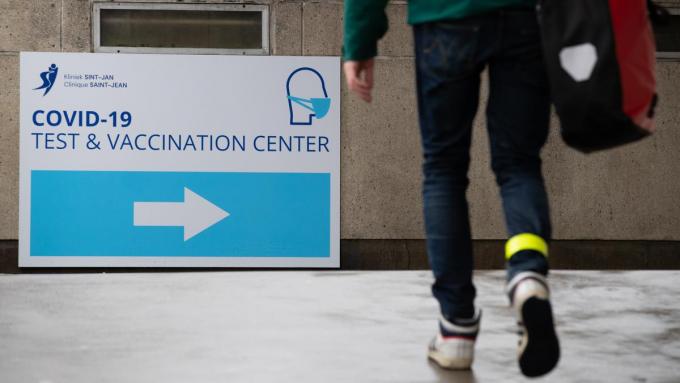Various EU countries and US corporations, such as Facebook and Google, have made vaccination mandatory for certain activities, for healthcare workers or employees, but Belgium has steered clear from such an obligation.
So far, the federal government has announced that Belgium's Covid Safe Ticket (which shows if someone has been vaccinated, tested negative for Covid-19, or recently recovered from the virus) will become mandatory for all indoor events as well as large outdoor events.
However, as vaccine specialists have said that Belgium needs to update its current vaccination rate from 70% - which it reached on Thursday - to 85% to 90% to create herd immunity against the more contagious delta variant, and as the number of vaccinations being administered is decreasing every day, Belgium may become pressured to rethink its position.
So, in what way are other countries solving this problem, and what is being said in Belgium?
Healthcare personnel
The mandatory vaccination of healthcare workers has been widely discussed in Belgium in recent weeks, after France, Italy, the UK and Greece already gave healthcare workers a deadline by which they have to be fully vaccinated.
A majority of vaccinated people in Belgium are in favour of compulsory vaccination (74% of the general population, 64% of healthcare professionals), however, a large majority of those who oppose vaccination are against making it mandatory (78% of the public, 92% of healthcare workers), according to a recent study.
Meanwhile, many Belgian hospitals and residential care centres are pleading for mandatory vaccination against the coronavirus of all care staff, and asked the government to make a decision on this during the last Consultative Committee.
“To reduce the coronavirus and provide safe care, it is necessary for the government to make vaccination obligatory for all employees in care facilities,” said Zorgnet-Icuro, the care umbrella organisation, which include all hospitals and most residential care centres in Belgium.
Federal Health Minister Frank Vandenbroucke has already said making vaccination mandatory for healthcare workers is 'plan B', and is instead asking to get a picture of how many staff members have and have not been vaccinated in each hospital, retirement home or health care institution by mid-August.
Vandenbroucke also wants to make the figures public so that each institution can see how high the vaccination rate is.
Work
Following the recent announcement by large corporations, including Google and Facebook and Netflix, that employees who are not vaccinated won't be allowed to enter their buildings from autumn, the discussion on whether Belgian workplaces can make vaccination mandatory was once again ignited.
Earlier this year, employers' organisation Voka already suggested that companies have the right to refuse someone who is not vaccinated, after which top executive Hans Maertens called for the introduction of a general vaccination obligation.
Johann Leten, a managing partner of the employers’ organisation Voka in Limburg province, added that an employer should be allowed to suspend an employee who declines to be vaccinated.
"People have to take into account that refusing a vaccine can have consequences in the workplace or in the search for work," he said.
However, this could pose a threat to employee's privacy, as it would give employers access to private medical information.
Jan Vanthournout, legal manager at SD Worx, said the overall legal opinion is that it is not possible, but he emphasised that 'law' could be interpreted broadly, however, according to Unia, the Centre for Equal Opportunities and Opposition to Racism, employers cannot impose this on their employees.
But, employers also have an obligation to pursue a welfare and prevention policy and therefore to take safety measures for all employees, Wilfried Rauws, professor of labour law at the VUB, explained.
"In other words, employers are not legally defenceless and can pursue a fairly strict policy in this regard," he said.
It has been suggested that employers could encourage their staff by, for example, only handing out bonuses to vaccinated employees, however, Unia argued that this would still be discriminatory, but added that a collective bonus given if a certain vaccination coverage rate within the company is reached would be possible.
Daily life
When it comes to making vaccination compulsory in a more general way, Marc Noppen, the CEO of the Brussels University Hospital (UZ Brussel), argued that vaccination should be made mandatory or be encouraged in Belgium by pushing for a coronavirus pass in more places.
"Our figures in Brussels (where just 53% of all adults have been fully vaccinated) are identical to those of London, Paris, Amsterdam or Rotterdam," Noppen said, arguing that this is a common metropolitan problem.
He stated that some people may be won over by introducing a coronavirus pass for everyday activities, like in France and Italy, where the announcement of Covid passes becoming mandatory for restaurants and bars and other public spaces resulted in vaccination rates soaring.
However, according to Unia, refusing access to goods or services to people because they are not vaccinated can be seen as discriminatory, and stressed that this also complicates matters for certain groups of people who cannot get vaccinated for medical reasons.
In Italy and France, the announcement of the extension of health passes also resulted in thousands taking to the streets and protesting against the measures, calling on the governments to resign, which may be one reason why Belgium is cautious in taking such decisions.

